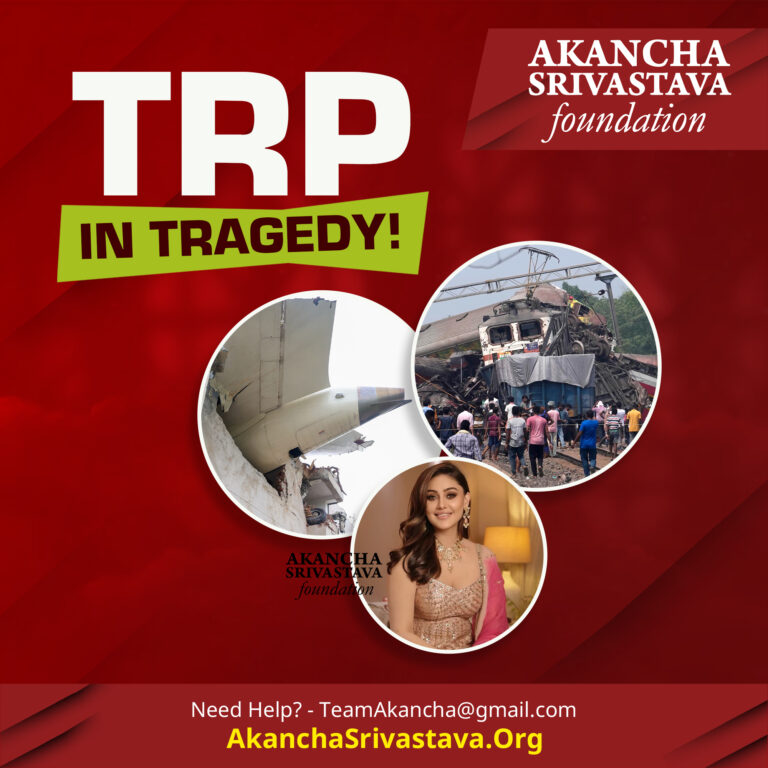What have we become as a society when someone’s death becomes our entertainment?
Every time a tragedy strikes, media crews swarm the scene like spectators, not reporters. They speculate, provoke, sensationalise, and in the process, rob grieving families of their dignity. This is not news. This is exploitation.
We saw it in the aftermath of the A171 crash. Cameras rolled as bodies were still being identified. Journalists asked devastated families how they felt, shoved mics into faces of those in shock, broadcast grief like it was breaking news. And just days later, in the Shefali Jariwala case, media houses had already started drawing conclusions, spinning narratives, and planting suggestions—long before any official word had come in. No family deserves to have their worst moment turned into a national circus.
The pattern isn’t new. After Sushant Singh Rajput’s tragic death, wild conspiracy theories spread like wildfire. Channels ran mock crime re-enactments. Emotional manipulation, fake “breaking news,” and round-the-clock speculations over his personal life dominated every platform. There was no pause for facts. There was no respect for those left behind. The same happened after Sidharth Shukla’s sudden passing. Within hours, his private life, friendships, and mental health were being dissected in full public view.
What are the consequences for these media houses? Practically none. The Press Council of India has clear guidelines forbidding the intrusion of privacy, the glorification or speculation around suicide, and the broadcasting of distressing visuals. Yet those rules are violated repeatedly. Recreating suicide scenes. Filming family members crying. Harassing doctors and neighbours for comments. And now, even individuals with mobile cameras believe they can act like unregulated media, going live from cremation grounds and hospital lobbies.
This is not journalism. This is a collective failure of empathy, ethics, and accountability. And it has real-world impact. Families are retraumatised. Young audiences absorb misinformation. Mental health is trivialised. The dead are robbed of their dignity and the living of their right to grieve in peace.
Where are the boundaries? Who enforces them? Why are grieving families left alone to protect their loved one’s memory from media violation?
This video is not about a single case. It is about all of us. It is a call to demand ethics in reporting. To say no to the TRP economy built on tragedy. To restore basic humanity in how we speak about death, loss, and grief.
Stay Aware, Stay Safe
Jai Hind
🔔 Subscribe for more cyber safety insights!
👍 Like, share & comment to spread awareness!
CONTACT US:
Website: www.AkanchaSrivastava.Org
Email: TeamAkancha@gmail.com
Twitter: @AkanchaS
Instagram: @akanchas
https://www.instagram.com/akanchas/
Facebook:
https://www.facebook.com/akanchasrivastava1
LinkedIn:
https://www.linkedin.com/in/akanchasrivastava/
ABOUT ‘AKANCHA SRIVASTAVA FOUNDATION’
The Akancha Srivastava Foundation is India’s leading social impact initiative dedicated to advancing cyber safety awareness and education. Established in February 2017, this not-for-profit Section 8 organization is a trusted voice in promoting safe online practices across the nation.
Distinguished Board of Advisors
Guided by an honorary advisory board of esteemed leaders:
- Former Special DGP RK Vij (Chhattisgarh Police)
- ADG Navniet Sekera (Uttar Pradesh Police)
- ADG Krishna Prakash (Maharashtra Police)
- Dr. Poonam Verma (Principal, SSCBS, Delhi University)
Our Mission
The Foundation is committed to educating, empowering, and building bridges between the public and authorities on critical cyber safety issues. Additionally, we specialize in forensics training for law enforcement, equipping them with the skills needed to tackle cybercrime effectively.

